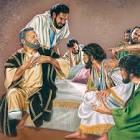
Jesus has been beginning to reveal to his disciples what lay ahead of him in Jerusalem. It is a terrifying prospect; the Romans had no mercy on those who were seen as a threat to their authority. Jesus may have seen crucifixions during his journeys, as the Romans executed many Jews: in AD 4, for example, the Roman general Varus crucified 2,000. The Lord must have yearned for the understanding and support of his friends; in today’s gospel he is repeating his prediction of the future events. Peter, James and John have had a glimpse of his glory in the Transfiguration. His message, however, seems not to have sunk in as the disciples are behaving like children, squabbling about who is the greatest. Perhaps this is why Jesus takes a little child in his arms at this point, to contrast his lack of pretence with the hubris of the adults. In today’s world people are encouraged to strive for more of everything, in order to be superior to others. This is in stark contrast to Christ’s teaching and example: at the Last Supper he would wash his disciples' feet, a menial task even a slave would not be asked to do. He then commanded them to do likewise.
Suffering is not good in itself. Jesus spent his ministry alleviating it. However, confronting worldly values will inevitably lead to consequences, some of which will very unpleasant. The Cross is never far away from love of neighbour. St Maximilian Kolbe offered his own life in exchange for that of another prisoner who was married and had a family. He did not seek the suffering for its own sake but so that the man might have a chance of being restored to his loved ones. Franciszek Galowniczek was later reunited with his wife and in 1982 was present at Maximilian’s canonisation.